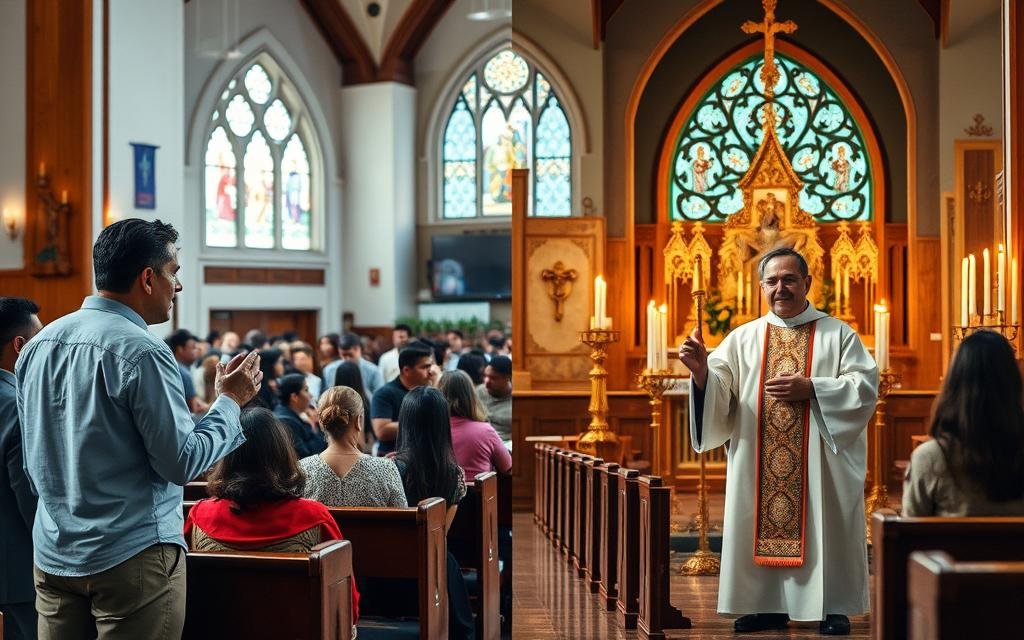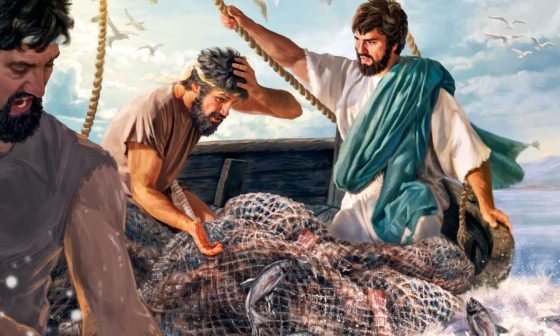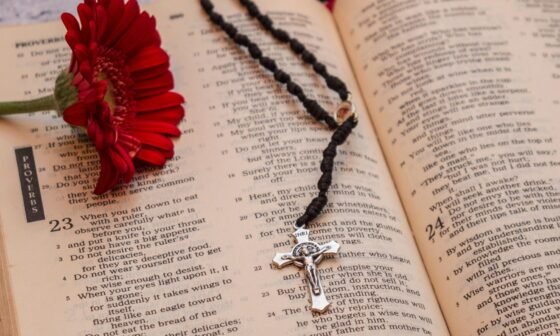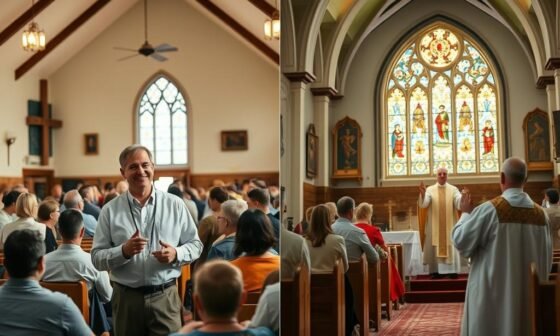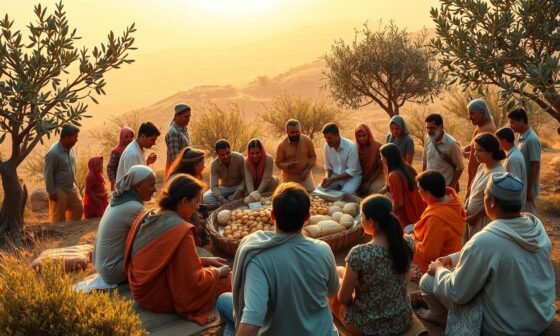We often wonder about the difference between a pastor and a priest in Christianity. How do these roles help us grow spiritually? Exploring the pastor vs priest comparison helps us see their unique callings and roles in our faith journey.
The difference between a pastor and a priest is more than just a title. It’s about their responsibilities and authority. These differences shape our experiences as believers.
Reflecting on your experiences with these leaders is important. What does the difference between pastor and priest mean to you? How has it shaped your faith community relationship? We’re here to help you grow spiritually and understand the roles of pastors and priests.
We’ll look at the roles of pastors and priests, from education to community responsibilities. Our aim is to give you a full understanding of the pastor priest comparison. This will help you see the value of both roles in your spiritual life. Let’s discover together how pastors and priests support our Christian growth.
Understanding the Key Difference Between Pastor and Priest
Many of us wonder about the roles of pastors and priests in Christianity. It’s key to know the biblical roots of each role. The roles of pastor and priest are not just about their titles. They are about their duties and powers in the Christian world.
Basic Definition of a Pastor
A pastor is a spiritual leader who looks after a congregation. They preach, teach, and offer care to their community. The debate between pastor and priest often focuses on their different roles and duties.
Basic Definition of a Priest
A priest is a spiritual leader who can do sacraments and lead worship. They also guide and care for their congregation. Knowing the differences between pastor and priest helps us see their special roles in the Christian world.
Fundamental Distinctions in Role and Authority
The roles of pastor and priest are not just about their names. They are about their duties and powers. Understanding these differences helps us see the value each brings to the Christian community.
Historical Evolution of Pastoral and Priestly Roles
The early Christian church shows us how pastors and priests came to be. By looking at their history, we learn why they matter today. Pastors and priests have different jobs, even though people often mix them up.
The story of pastors and priests is really interesting. It shows how their jobs have changed over time. The debate between ministers and priests also shows their unique roles.
Some important points about the history of these roles include:
- The early Christian church and the emergence of pastoral roles
- The development of priestly roles and their responsibilities
- The adaptation of these roles to the needs of the church and society
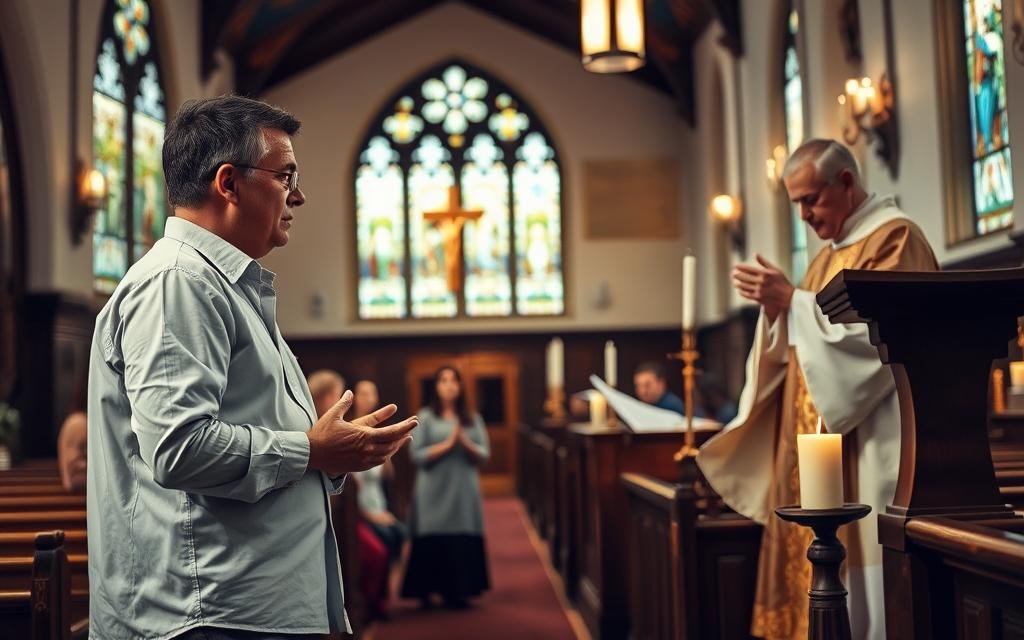
Knowing the history of pastors and priests helps us see their value today. As we learn more about their differences, we understand their roles better. They help guide and grow our faith.
Educational Requirements and Training
Let’s look at what pastors and priests need to learn. They have different paths to get ready for their jobs. This shows how their training fits their duties.
Pastors and priests have different school paths. Pastors go to seminary. They learn about the Bible, theology, and caring for people. Priests have a special training. They study philosophy, theology, and get spiritual guidance.
Seminary Education for Pastors
- Typically lasts 3-4 years
- Covers biblical studies, theology, and pastoral care
- Prepares pastors for congregational leadership and ministry
Priestly Formation and Requirements
- Includes philosophical and theological studies
- Emphasizes spiritual direction and discipline
- Prepares priests for sacramental ministry and spiritual leadership
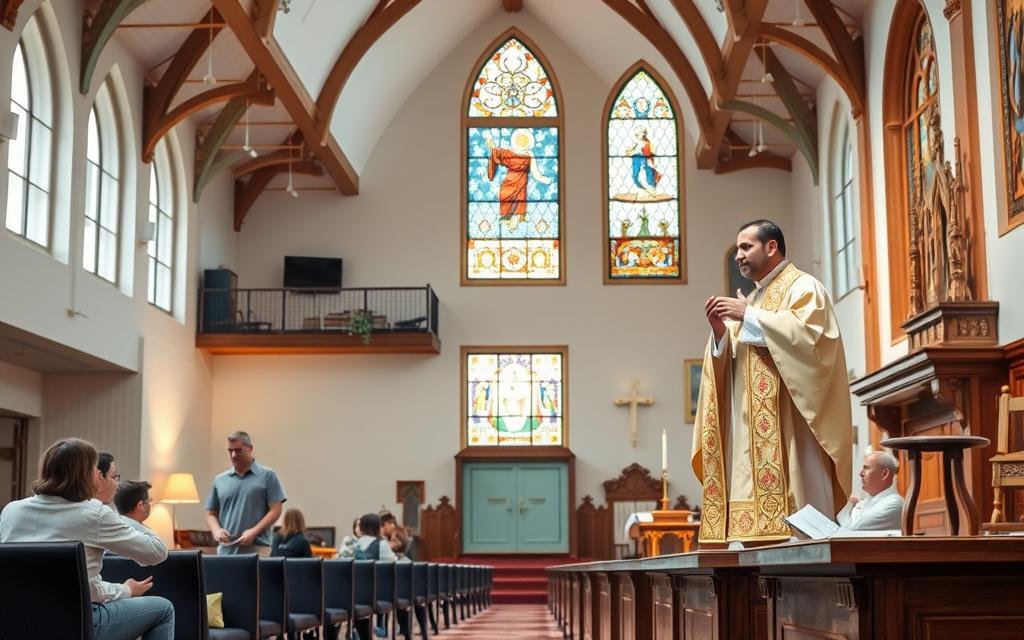
Both pastors and priests keep learning to do their jobs well. Knowing what they study helps us see their hard work and skill.
Denominational Perspectives on Religious Leadership
Christian denominations see religious leadership in different ways. They shape how they view pastors and priests. This diversity makes Christianity rich and varied.
How a pastor and a priest are seen changes from one denomination to another. Some focus on the clergy difference. Others look at the pastor versus priest comparison. Knowing this helps us understand the roles better.
Important parts of denominational views on religious leadership include:
- Leadership roles and responsibilities
- Ordination and training processes
- Worship and sacramental practices
Looking into these areas helps us understand the clergy difference and the pastor versus priest comparison. It shows us the value of both roles in Christianity.
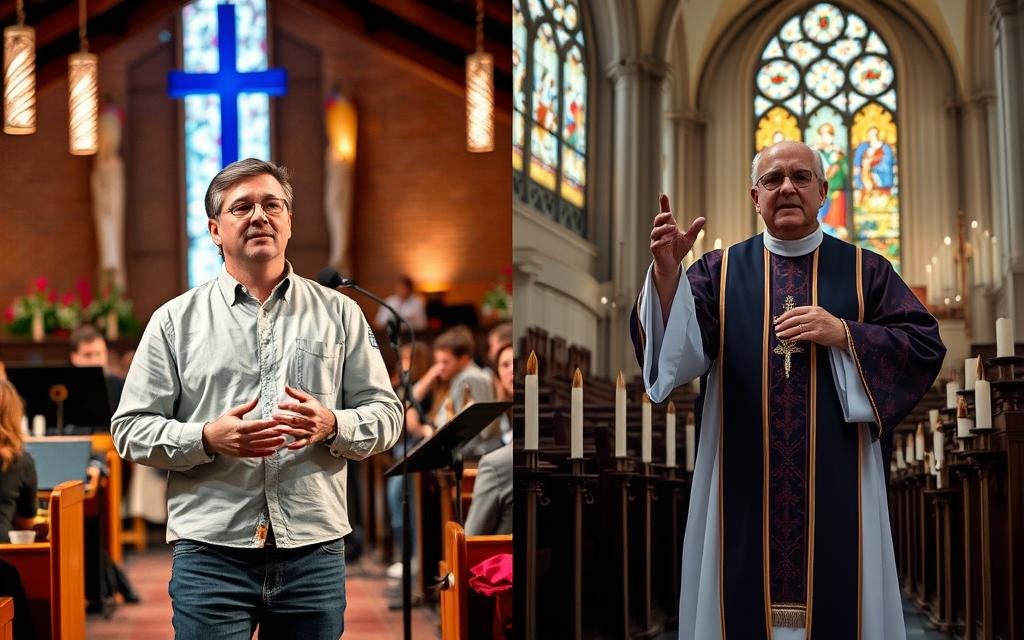
Marriage and Family Life Distinctions
Exploring what makes pastors and priests different, we see a big difference in their views on marriage and family. This comes from their beliefs and history.
The pastor and priest difference shows in their personal lives too. For example, some priests must not get married. This choice affects their life and work a lot.
Celibacy Requirements for Priests
Being single is seen as a way to focus on God and the church. But, it’s hard for priests to find joy and connection alone.
Family Life of Pastors
Pastors, on the other hand, are encouraged to have strong family ties. Being a spouse and parent is part of their job. This shows the special challenges and chances each role has.
Understanding these differences helps us see the value of both pastors and priests. They serve others and share God’s message in their own ways. Whether through being single or having a family, their commitment is clear.
Sacramental Authority and Responsibilities
Let’s look at what pastors and priests do. They have special jobs that help people grow spiritually. Knowing the difference between them is important.
These roles come from the Bible. In different churches, they do things differently. For example, they both give out sacraments. We can learn from their leadership and guidance.
Some important things they do include:
- Administering sacraments such as baptism and communion
- Providing spiritual guidance and counseling
- Leading worship services and prayers
We can see how important they are to the church. As we learn more, we’ll see what makes each role special. This helps believers grow spiritually.
Community Engagement and Pastoral Care Approaches
Many of us wonder how pastors and priests connect with their communities. They offer care and support in different ways. It’s key to see how they lead and care for their parishes.
Pastors and priests have different jobs in their communities. Pastors lead, while priests do many tasks in the parish. Knowing these differences helps us see how they help their communities.
Community Leadership and Parish Life
Pastors guide their churches with spiritual advice and support. They help their communities grow in faith. Priests, on the other hand, do many tasks like sacraments, counseling, and helping others.
Social Justice and Outreach
Pastors and priests work together for justice and helping others. They tackle big issues like poverty and unfairness. By understanding their roles, we see their big impact on helping others.
Modern Challenges and Evolving Roles
We live in a time of big change for clergy. Priest or pastor roles are changing to fit today’s world. It’s key to understand how these roles are adapting.
Technology is a big challenge for pastors and priests. Social media and online groups change how we connect and share faith. Clergy must find new ways to share their message and build community online.
- Using technology to enhance worship and community engagement
- Developing online resources and support for spiritual growth
- Building partnerships with other organizations to address social justice issues
By embracing these changes, pastors and priests can keep making a difference. They can help their congregations and the community in new ways.
Conclusion: Understanding the Unique Value of Both Roles
We’ve looked at the differences between pastors and priests. These two roles are key in the church. They have different jobs but both are very important.
Pastors help their church by preaching and leading worship. They also give personal care to their members. Priests, on the other hand, handle special church duties like the Eucharist.
Knowing the pastor and priest similarities and clergy difference pastor priest helps us see their value. Both roles are important in helping people grow in faith. They help the community in different ways.
Let’s keep learning from both pastors and priests. Their unique roles help us on our spiritual paths. By understanding their differences, we can grow closer to our faith.
FAQ
What is the difference between a pastor and a priest in Christianity?
A pastor leads a Protestant church, preaching and guiding the community. A priest in Catholic or Orthodox churches can do sacraments like the Eucharist and baptism.
What are the basic definitions of a pastor and a priest?
A pastor is a leader in a Christian church, teaching and guiding. A priest is a clergy member in Catholic or Orthodox churches, leading worship and doing sacraments.
How do the roles and authority of pastors and priests differ?
Pastors have more freedom, focusing on teaching and leading the community. Priests have a set role, leading worship and doing sacraments.
What are the educational requirements and training for pastors and priests?
Pastors get seminary education and practical experience. Priests in the Catholic Church have a longer formation, including seminary and sacramental training.
How do different Christian denominations view the roles of pastors and priests?
Christian denominations have different views on religious leaders. Protestant churches focus on the pastor. Catholic and Orthodox churches emphasize the priest’s role and sacraments.
What are the distinctions between pastors and priests in terms of marriage and family life?
Priests in the Catholic Church must be celibate. Pastors in Protestant churches can marry and have families. This affects their personal and work lives.
What are the sacramental authorities and responsibilities of pastors and priests?
Priests can do sacraments like the Eucharist and baptism. Pastors in Protestant churches focus on preaching and teaching, with less sacramental work.
How do pastors and priests engage with their communities and provide pastoral care?
Pastors often lead community efforts and outreach. Priests focus on worship and sacraments. Both provide care and support to their congregations.
What are some of the modern challenges and evolving roles of pastors and priests?
Pastors and priests face new challenges like technology’s impact and social issues. They must adapt to serve their communities well.

